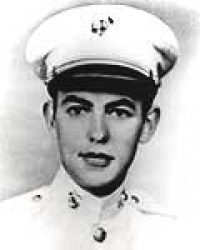
 |
|
|
||
|
Richard E. Fleming |
||||
|
Engagements: • World War II (1941 - 1945) |
||||
| Biography: | ||||
|
Richard E. Fleming Captain Richard E. Fleming (2 November 1917 - 5 June 1942) was a U.S. Marine officer and aviator who was posthumously awarded the Medal of Honor for his heroism during the Battle of Midway in World War II. Richard E. Fleming was born in Saint Paul, MN, on 2 November 1917. He attended Saint Thomas Military Academy and graduated in the Class of 1935. During his senior year he was chosen as top student officer. From Saint Thomas, he entered the University of Minnesota and became president of Delta Kappa Epsilon fraternity. He received his Bachelor of Arts degree in 1939. Soon after graduation, he enlisted in the Marine Corps Reserve and applied for flight training. He was sent to the Naval Air Station in Pensacola, FL, for training and finished at the top of his class in 1940. He was promoted to First Lieutenant in April 1942 and to Captain a month later. Captain Fleming's first duty station was the Naval Air Base in San Diego, CA. Ten days after World War II began he flew from Pearl Harbor to Midway Island. He fought in the Battle of Midway as Flight Officer of Marine Scout Bombing Squadron 241. When his squadron commander was shot down during the initial attack on a Japanese aircraft carrier, Fleming took command of the division. Leaving the remainder of his formation, he dived to the perilously low altitude of 400 ft. exposing himself to enemy fire in order to score a hit on the ship. The following day, 5 June 1942, Capt. Fleming led the second division of his squadron in a mass dive-bombing assault on the Mikuma. Putting his plane into an approach glide, he again dived low but his bomb narrowly missed hitting the ship. His plane, hit by anti-aircraft fire, caught fire. Unable to pull out of his dive, Capt. Fleming, his plane a mass of flames, crashed into the sea. Medal of Honor Rank and organization: Captain, U.S. Marine Corps Reserve. Place and date: Midway Atoll, 4 and 5 June 1942. Citation: For extraordinary heroism and conspicuous intrepidity above and beyond the call of duty as Flight Officer, Marine Scout Bombing Squadron 241, during action against enemy Japanese forces in the battle of Midway on 4 and 5 June 1942. When his Squadron Commander was shot down during the initial attack upon an enemy aircraft carrier, Capt. Fleming led the remainder of the division with such fearless determination that he dived his own plane to the perilously low altitude of 400 feet before releasing his bomb. Although his craft was riddled by 179 hits in the blistering hail of fire that burst upon him from Japanese fighter guns and antiaircraft batteries, he pulled out with only 2 minor wounds inflicted upon himself. On the night of 4 June, when the squadron commander lost his way and became separated from the others, Capt. Fleming brought his own plane in for a safe landing at its base despite hazardous weather conditions and total darkness. The following day, after less than 4 hours' sleep, he led the second division of his squadron in a coordinated glide-bombing and dive-bombing assault upon a Japanese battleship. Undeterred by a fateful approach glide, during which his ship was struck and set afire, he grimly pressed home his attack to an altitude of 500 feet, released his bomb to score a near miss on the stern of his target, then crashed to the sea in flames. His dauntless perseverance and unyielding devotion to duty were in keeping with the highest traditions of the U.S. Naval Service. On 24 November 1942, President Franklin D. Roosevelt presented the Medal of Honor to Capt. Fleming's mother. Post-War Myths and Clarifications Regarding Fleming's Attack The "battleship" attacked by Capt. Fleming was actually the heavy cruiser Mikuma. Interestingly, despite the clear language in Fleming's Medal of Honor citation, which noted (correctly) his having achieved a near miss and then crashing into the sea, the common wisdom of the battle has often had Fleming striking Mikuma with his bomb, and then crashing his aircraft onto her aft turrets. This construction is based upon the eyewitness accounts of both a Japanese naval officer and Fleming's wingman. Some sources state that the wreckage of Fleming's plane is shown in the very famous image of Mikuma in a pre-sinking state on the early evening of 6 June. Wreckage located on the roof of #4 turret has commonly been ascribed as that of Fleming's aircraft. However, Mikuma had suffered catastrophic damage from the detonation of her own Type 93 torpedo mounts, which were located immediately forward of the main battery turrets, on the main deck. The resulting explosions had largely destroyed the aft portion of Mikuma's funnel, as well as her rear superstructure and mainmast. This accounts for the wreckage on her turret roof. Similarly, the particulars of Mikuma's damage, as well as the American attacks against her, were very accurately recorded by the Japanese, and these sources make no mention of a hit by an enemy aircraft. There is an unresolved controversy as to whether Fleming's plane did or did not strike the Japanese ship. This, of course, does not detract from Fleming's gallantry in combat, nor diminish the honor of his memory, as the particulars of his Citation make clear. Death and Burial Captain Richard E. Fleming was killed in action on 5 June 1942. His body was lost at sea. His name is inscribed on the Tablets of the Missing at National Memorial Cemetery of the Pacific in |
||||
| Honoree ID: 1390 | Created by: MHOH | |||
Ribbons
Medals
Badges
Honoree Photos
 |  |  |
 |  |
 |


